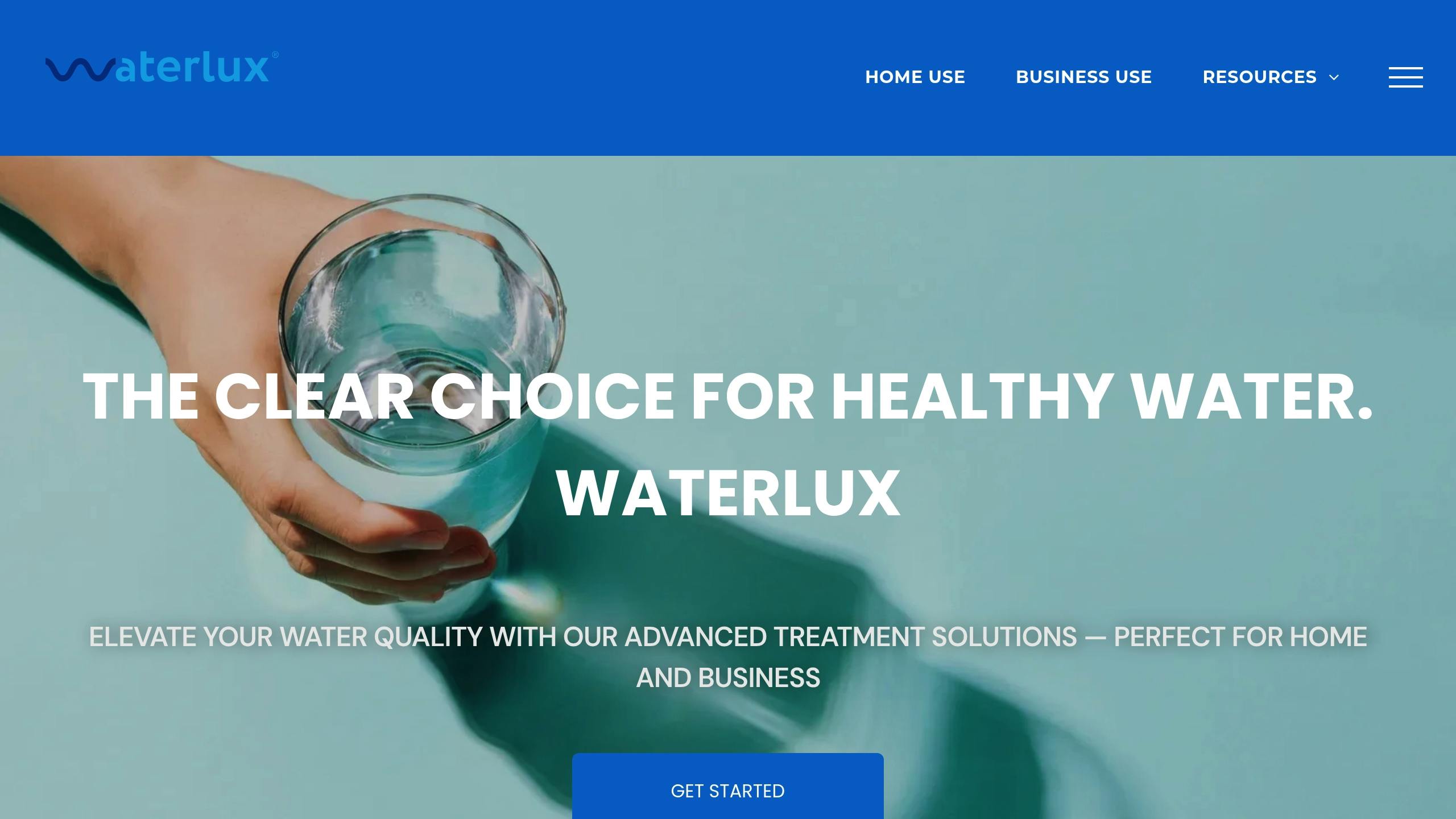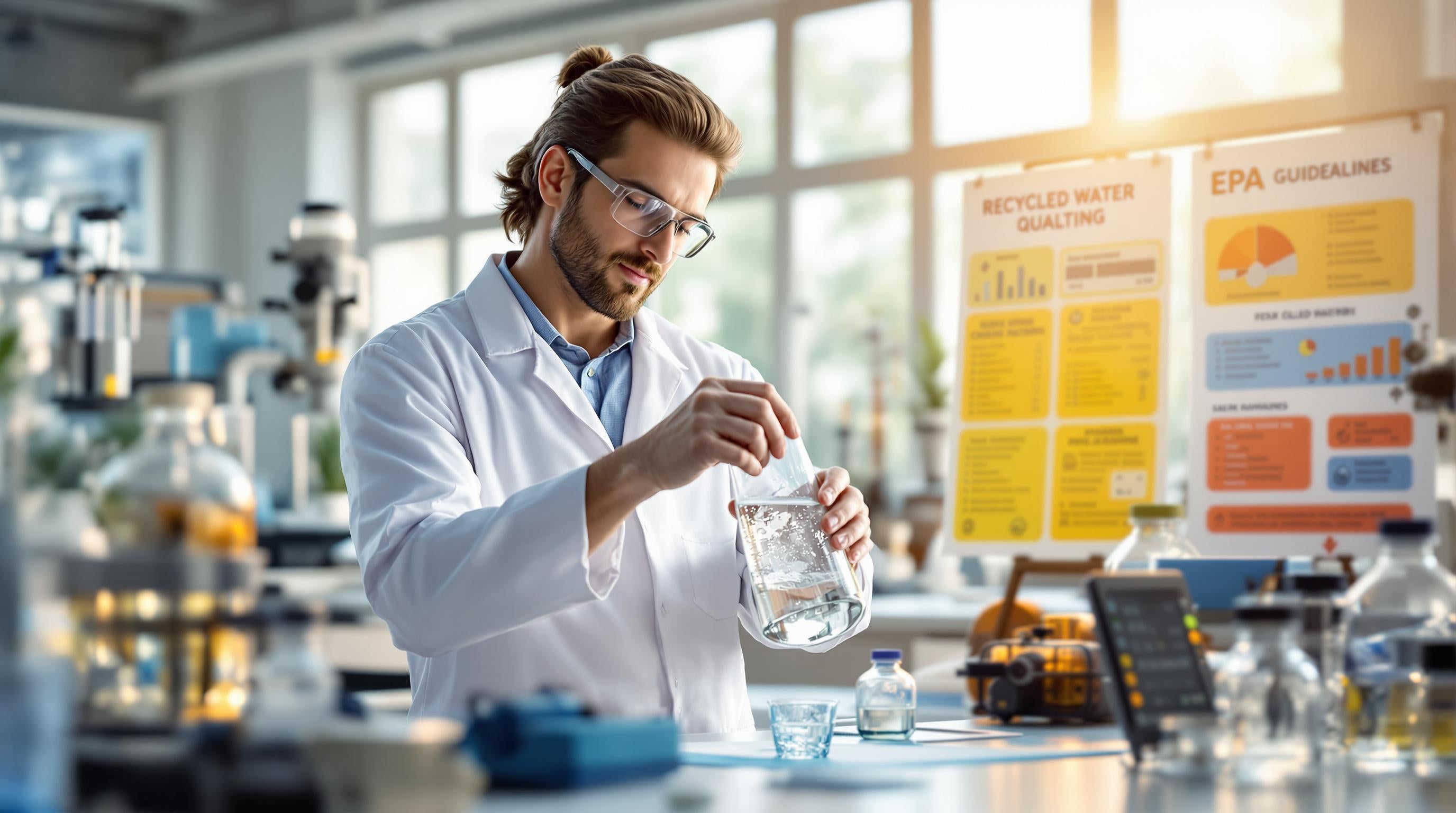Recycled water, also known as reclaimed water, is treated wastewater made safe for reuse in irrigation, industry, and even drinking. The EPA (Environmental Protection Agency) sets strict guidelines to ensure its safety and quality. These guidelines cover:
- Microbial and Chemical Limits: Controls pathogens (like coliforms and viruses) and chemicals (like heavy metals and pH levels).
- Testing Requirements: Daily, weekly, or monthly monitoring to ensure compliance.
- Treatment Processes: Ranging from basic filtration to advanced methods like reverse osmosis and UV disinfection.
- Applications: Used for irrigation, industrial cooling, aquifer recharge, and, with advanced treatment, even drinking water.
For compliance, programs must follow EPA standards, use proper treatment technologies, and maintain consistent testing. Companies like WATERLUX offer systems aligned with these requirements, making water recycling safer and more accessible.
EPA Regulated Contaminants In Drinking Water

EPA Water Quality Standards
The EPA establishes water quality standards for recycled water to safeguard both public health and the environment. These standards vary depending on how the water will be used, with the most stringent rules applied to situations involving direct human contact. The guidelines address both microbial and chemical risks through clearly defined criteria.
Microbial Safety Limits
Microbial limits focus on contaminants like fecal and total coliforms, protozoan cysts, and viruses. The exact thresholds depend on the water's intended use. For instance, water used for unrestricted urban purposes, such as irrigating public parks or residential areas, must meet stricter microbial standards compared to water used for agriculture or industrial processes. Daily testing ensures these safety levels are consistently met.
Chemical Safety Limits
Chemical parameters are equally important in maintaining water safety. The EPA sets limits for factors such as total dissolved solids, pH, turbidity, chlorine residual, and heavy metals. These measures help protect both the environment, such as soil quality, and infrastructure like irrigation systems and equipment.
Testing Requirements
The EPA requires frequent testing to monitor water quality. Key parameters, such as microbial counts, are tested daily, while other indicators - like chemical oxygen demand, suspended solids, and organic compounds - are checked weekly or monthly. Records must be kept according to state regulations, and any deviations should be reported immediately. Advanced real-time sensors are increasingly being adopted to allow quicker detection and response to issues.
Where Recycled Water Is Used
Recycled water, meeting EPA standards, serves multiple purposes, each requiring specific treatment levels to ensure safety and compliance. Here's a closer look at its primary uses:
Irrigation Applications
Recycled water is widely used for irrigating golf courses, farms, and urban green spaces. In areas facing water shortages, it helps conserve drinking water by providing an alternative for agricultural needs.
Industrial and Drinking Water
Industries use recycled water for tasks like manufacturing and cooling systems. With advanced treatment processes, recycled water can even meet the standards required for drinking water.
Aquifer Recharge
Recycled water plays a role in replenishing aquifers, helping to maintain groundwater levels. Techniques like surface spreading and injection wells are used to combat groundwater depletion and ensure long-term water availability.
sbb-itb-38ad72f
Treatment Methods for EPA Compliance
Meeting EPA guidelines involves a mix of primary and advanced water treatment techniques to ensure safety and quality.
Basic Treatment Steps
The recycling process starts with primary treatment to eliminate contaminants. Key steps include:
- Screening: Removes large debris.
- Sedimentation: Allows solids to settle.
- Biological Treatment: Breaks down organic matter.
- Filtration: Captures any remaining particles.
These steps prepare the water for more advanced purification processes.
Advanced Treatment Methods
For stricter EPA standards, advanced methods come into play. Some of the most effective techniques are:
| Treatment Method | Purpose | Compliance Benefit |
|---|---|---|
| Reverse Osmosis | Removes dissolved solids and toxins | Meets strict chemical safety limits |
| UV Disinfection | Destroys microorganisms | Ensures microbiological safety |
Companies like WATERLUX specialize in integrating these methods into efficient, ready-to-use solutions.
WATERLUX Treatment Options

WATERLUX offers systems designed to meet EPA requirements, combining multiple treatment stages for reliable water quality. One standout option is the WATERLUX Alkaline Reverse Osmosis with Electric Pump RO-202S priced at $1,700.00, which includes:
- A multi-stage filtration system.
- Reverse osmosis technology.
- Integrated alkaline water features.
For homeowners in Broward, Miami-Dade, and Palm Beach counties, WATERLUX also provides complete home systems that handle filtration, purification, and water softening. If you're looking for a more budget-friendly option, the WATERLUX Reverse Osmosis Faucet at $69.00 is a practical choice to ensure your water aligns with EPA standards.
Meeting EPA Requirements
To establish an EPA-compliant recycling program, it's essential to align with EPA guidelines, implement suitable treatment methods, and set up effective monitoring systems.
Starting a Reuse Program
Launching a water recycling program requires careful planning and execution. Here's a breakdown of the key phases:
| Phase | Requirements | Actions |
|---|---|---|
| Planning | Site Assessment | Assess the quality of the water source and define its intended purpose. |
| Infrastructure | Treatment System Setup | Install necessary filtration and monitoring equipment. |
| Compliance | Documentation System | Create schedules for testing and establish reporting protocols. |
| Operation | Quality Control | Conduct regular maintenance and testing to ensure system efficiency. |
Consider using certified advanced treatment systems, such as WATERLUX solutions, to enhance both monitoring and treatment processes.
Safety and Public Information
Once the reuse program is operational, maintaining safety and transparency is crucial. Key actions include:
- Routine Testing: Regularly analyze microbial and chemical parameters to ensure water safety.
- Public Updates: Share clear and accessible information about water quality and safety measures.
- Detailed Records: Keep thorough documentation of all water quality data.
- Emergency Plans: Develop and implement protocols to address any quality issues that may arise.
Staff Training Requirements
Proper training is a cornerstone of program success. Focus on these essential areas:
- Basic Certification: Ensure operators complete state-approved water treatment certification courses.
- Advanced Training: Provide specialized instruction on modern treatment technologies.
- Safety Measures: Train staff on emergency response protocols and safe handling practices.
- Record Keeping: Teach proper documentation and regulatory reporting procedures.
For facilities using advanced systems like WATERLUX, operators must receive specific training on handling technologies such as reverse osmosis to ensure optimal system performance and compliance with EPA standards.
Summary
EPA Standards and Their Role
EPA guidelines establish the foundation for safe water recycling practices across the U.S. These rules define essential thresholds for microbial and chemical safety, ensuring both public health and environmental protection.
| Aspect | Impact | Outcome |
|---|---|---|
| Microbial Limits | Reduces waterborne diseases | Safer communities |
| Chemical Parameters | Regulates harmful substances | Protects ecosystems |
| Testing Protocols | Maintains consistent quality | Reliable water availability |
These strict regulations create a need for comprehensive treatment solutions.
WATERLUX Products and Services
WATERLUX offers advanced water treatment systems designed to align with EPA standards. Their product lineup includes:
- WATERLUX Alkaline Reverse Osmosis System (RO-202S) – $1,700.00
- KYK55000 Alkaline Water Ionizer – $1,299.00
In addition to these systems, WATERLUX provides professional installation, ongoing maintenance, and in-person demonstrations at their showroom located at 1480 SW 3rd St, Pompano Beach, FL 33069.

